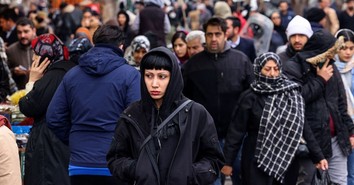Why Trump’s Attack on Iran Was Long Overdue

It's become old hearing the tropes of pundits on the left and the right that the US attack on Iran this week was because of Israel, that Israel somehow misled or manipulated President Trump into conducting the attack, that President Trump consented because of Israel, and his heavily pro-Israel Christian base of support, for his Jewish grandchildren, or other deceptions that go on and on.
The truth is that President Trump acted responsibly in America's best interests first. If any US president in recent history, if ever, is unlikely to be manipulated to carry out such a bold attack or anything, that would be President Trump. Indeed, Israel benefited, and indeed, Israel lobbied for US participation. But even if we remove Israel from the picture, what was done was justified, successful, and long overdue. The need to eliminate Iranian nuclear sites a decade after President Obama spiked the ball in the endzone about how his JCPOA deal would prevent Iran from having a nuclear weapon is a direct consequence of years, if not decades, of appeasing the Islamic Republic, providing it billions for its infrastructure and funding its terrorist proxies, and looking at the Iranian threat through the prism of how the appeasers want to see things, rather than how they are.
Since the 1979 Islamic Revolution, Iran has been an unrelenting threat to the United States and its interests, driven by Islamic messianism, state-sponsored terrorism, and efforts to destabilize US allies. The Revolution, during which the pro-American Shah was thrown under a bus by Jimmy Carter, marked the beginning of a hostile relationship. Iran's actions—ranging from direct attacks to proxy warfare and covert operations—have consistently challenged US security and interests.
Suppose there were not such an international threat. In that case, it's hard to imagine concerns and assessments today that Iranian agents have infiltrated American society, even establishing sleeper cells to conduct future operations—hardly a regime to be trusted.
The 1979-1981 Iran Hostage Crisis was the first shot when Iranian students, supported by the Islamic regime, seized the US Embassy in Tehran, holding 52 Americans hostage for 444 days. This violation of international law humiliated the US, strained its global credibility, weakened its image and deterrence, and cemented Iran's adversary's willingness to confront America directly.
Through the 1980s, Iran expanded its state-sponsored terrorist threats primarily via proxies. The 1983 bombing of the U.S. Marine barracks in Beirut, killing 241 American military, was carried out by Hezbollah terrorists under Iranian direction. Earlier that year, the US Embassy in Beirut was bombed, killing 63, with evidence pointing to Iranian involvement. These attacks showcased Iran's strategy of using global terrorism to target US interests while avoiding direct accountability or its fingerprints.
Iran's support for terrorism continued into the 1990s. The 1996 Khobar Towers bombing in Saudi Arabia, where 19 US Air Force were killed, was linked to Iranian-backed Hezbollah terrorists. Proxy attacks persisted into this century, particularly in Iraq. Following the 2003 US invasion, Iran's IRGC Quds Force armed and trained Shia militias, supplying them with sophisticated weapons that killed hundreds of US troops. A 2011 US military assessment estimated that Iranian-backed groups were responsible for at least 1,000 American casualties in Iraq, highlighting Iran's role in undermining US operations.
Iran's nuclear program became a major threat to US interests. The Islamic Republic's pursuit of nuclear capabilities raised fears of a nuclear-armed state that could threaten the US itself and US allies, including Israel, Saudi Arabia, the UAE, and others. Creating a nuclear umbrella would also forever challenge American security. The 2015 Joint Comprehensive Plan of Action (JCPOA) ostensibly limited Iran's nuclear activities, but the regime violated it while the ink was still wet. After the US withdrawal in 2018, Iran resumed uranium enrichment beyond agreed limits to levels that could only be used for military purposes, all along while purporting to claim that the country that sits on top of ten percent of the world's oil just wanted peaceful nuclear energy.
By 2023, the International Atomic Energy Agency (IAEA) reported Iran had enough enriched uranium to potentially produce several nuclear weapons, intensifying concerns about its intentions and the risk to US security. Just before Israel's recent attack, the IAEA issued another report of Iran's violations, making it clear that creating a nuclear weapon could be imminent.
There is also a longstanding fear that Iran has infiltrated American society with covert operatives or sleeper cells—agents embedded in communities, awaiting orders to act. This concern is rooted in Iran's history of conducting terrorist operations abroad. The IRGC and Ministry of Intelligence (MOIS) have been linked to plots targeting dissidents and foreign officials in Western countries and striking "soft" (nonmilitary) targets worldwide. The 2011 Iranian plot to assassinate the Saudi ambassador in Washington, D.C., where the IRGC attempted to hire a Mexican cartel for the attack, was among the most brazen, raising alarms about Iran's willingness to operate on US soil.
Iran's global intelligence activities further fuel the possibility of sleeper cells. It remains a clear and present danger. In Europe, Iranian agents have been arrested for plotting attacks, such as a 2018 attempt to bomb an opposition rally in Paris. In the US, intelligence reports have warned of Iranian efforts to recruit within diaspora communities or use cultural and academic exchanges as cover for espionage. A 2020 FBI assessment noted potential Iranian operatives posing as students or professionals conducting surveillance or preparing for future operations. The reality of this threat on US soil underscores that chanting "Death to America" is more than just to rally people around the flag, but a genocidal call to arms.
In 2022, US authorities charged an IRGC-linked terrorist with plotting to assassinate former National Security Advisor John Bolton, indicating Iran's intent to target American officials. Iranian threats are also attributed to assassination attempts against President Trump. These, combined with Iran's history of covert operations and overt lying, reinforce the potential threat of sleeper cells that could be activated. Their presence is not a consequence of the US operation this week but a cause for it.
Those who blame Israel for US involvement are either deceived or deceitful. Those who claim it is not in American interests are blind to the threats that the Islamic Regime poses and which US appeasement has allowed to fester.
*The opinions in this commentary do not necessarily reflect those of Crosswalk Headlines.
Photo Credit: ©Getty Images/Victority
Published Date: June 24, 2025
Jonathan Feldstein was born and educated in the U.S. and immigrated to Israel in 2004. He is married and the father of six. Throughout his life and career, he has been blessed by the calling to fellowship with Christian supporters of Israel and shares experiences of living as an Orthodox Jew in Israel. He writes regularly for a variety of prominent Christian and conservative websites and is the host of Inspiration from Zion, a popular webinar series and podcast. He can be reached at firstpersonisrael@gmail.com
Originally published June 24, 2025.







